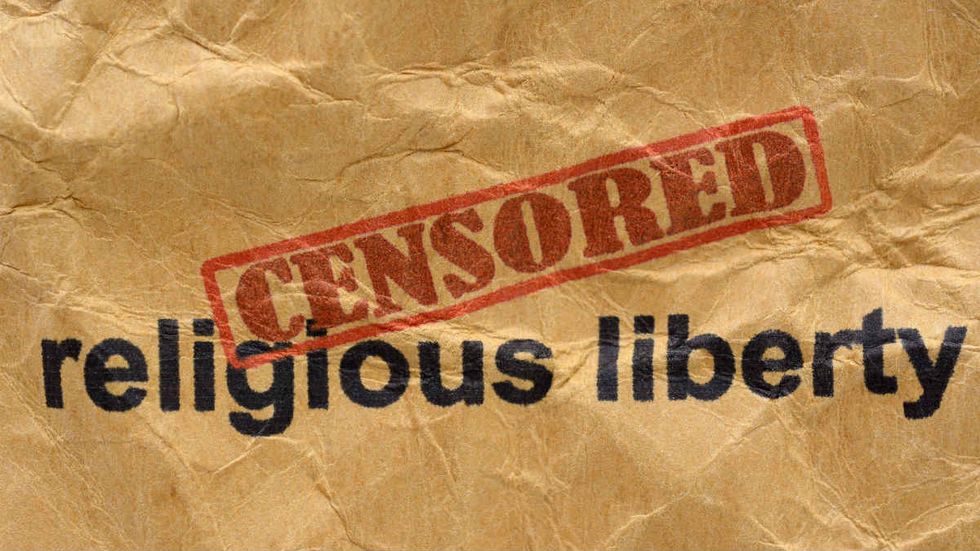
© 2024 Blaze Media LLC. All rights reserved.
Should artists be forced to promote messages against their conscience? The Supreme Court could be taking up the question soon, if a recent lower-court ruling out of Kentucky is any indication.
Late last week, news broke that the Kentucky Court of Appeals sided with Hands On Originals, a print shop in the Bluegrass State, saying that business owner Blaine Adamson did not have to engage in business that conflicts with his religious beliefs. The ruling comes five years after he told a prospective client that he could not make T-shirts for a gay pride festival in 2012.
The Associated Press has more details:
Chief Judge Joy Kramer wrote in her opinion that the city's ordinance prohibiting discrimination based on sexual orientation does not prohibit the owners of Hands On Originals from "engaging in viewpoint or message censorship." Kramer said the business objected to the message of gay pride, not anyone's sexual orientation.
"Thus, although the menu of services HOO provides to the public is accordingly limited, and censors certain points of view, it is the same limited menu HOO offers to every customer and is not, therefore, prohibited by the fairness ordinance," the ruling states.
The legal question at hand is one of the biggest religious liberty issues facing the country, as religious business owners have faced a number of struggles following the 2015 “Obergefell v. Hodges” gay marriage decision and a slew of state-level LGBT laws that seek to eliminate traditional beliefs on marriage, biology, and sexuality from the marketplace.
Plaintiffs argue that not creating pro-LGBT messages amounts to class-based discrimination prohibited in federal law. Proponents argue that this is inaccurate and that it constitutes abstaining from an action based on belief – a long-respected protection of the First Amendment.
The Kentucky ruling differs from other recent lower-court rulings on similar questions. The Washington Supreme Court ruled that a Christian florist was not within her rights to decline serving a same-sex wedding ceremony.
Now that the lower courts have split in their opinions, the issue is more appealing for the U.S. Supreme Court, Jim Campbell, senior counsel at Alliance Defending Freedom, tells Conservative Review. ADF is the pro-religious liberty legal nonprofit representing Blaine Adamson in Kentucky.
The case to watch now is that of owner Jack Phillips and Masterpiece Cake Shop in Lakewood, Colo. Phillips was recently turned down by the Colorado Supreme Court after the Colorado Civil Rights Commission previously found him guilty of discrimination, but it could very well be on the docket for the next judicial session in D.C.
(As ADF notes, “In contrast to the ruling against Phillips, the commission found last year that three other Denver cake artists were not guilty of creed discrimination when they declined a Christian customer’s request for a cake that reflected his religious opposition to same-sex marriage.”)
“They’re holding [the case] for two months now, which is kind of odd,” Campbell says. “Whenever they’re holding something, it obviously means that it’s caught someone’s attention. Which is a good sign … because the default is to be denied.” He says a decision on the petition could come as soon as Monday.
There are a handful of other cases that all evaluate the intersection of conscience rights, free expression, and non-discrimination that are currently working through the courts. Should the current petition on Masterpiece be denied, these cases will likely continue to work their own ways up in its stead.
But there are still many variables in this equation. Despite the messianic treatment Neil Gorsuch received from many conservatives, and as often as he is used as the go-to counter-example to complaints about Trump’s betrayals on a host of other issues (like immigration and religious liberty), one must remember that there are still eight other justices on the high bench. In replacing Antonin Scalia, the balance of the court was restored to the same makeup that gave the American people decisions like “Obergefell” and “Windsor.”
Hopeful rumors are currently buzzing around the beltway conservative enclaves about the prospect of Justice Anthony Kennedy’s retirement this summer. If true, the vacant seat and nuclear appointment rules would give the Trump administration the ability to tip the balance of the bench in a more originalist direction, which would bode well for any of these cases. But this nothing more than speculation and rumor at this point.
A multitude of factors affect the final outcome. Will the First Amendment be weakened or buttressed in post-Obergefell America? It would appear that the answer will not have to wait very long — at least on judicial time.
Want to leave a tip?
We answer to you. Help keep our content free of advertisers and big tech censorship by leaving a tip today.
Want to join the conversation?
Already a subscriber?
more stories
Sign up for the Blaze newsletter
By signing up, you agree to our Privacy Policy and Terms of Use, and agree to receive content that may sometimes include advertisements. You may opt out at any time.
© 2024 Blaze Media LLC. All rights reserved.
Get the stories that matter most delivered directly to your inbox.
By signing up, you agree to our Privacy Policy and Terms of Use, and agree to receive content that may sometimes include advertisements. You may opt out at any time.



